- Home
- Shelby Foote
Love in a Dry Season Page 5
Love in a Dry Season Read online
Page 5
His education was rounded off with a year at Harvard Business School, during which the most memorable times were weekends in New York. Jeff would load his car on a Friday and drive down, crowded to the fenders with young men like himself, ex-athletes mostly with over-developed chests and heavy thighs, spending (like him) a final year of youth before entering their fathers’ businesses, taking their places at desks where their bellies and pectoral muscles would sag with the accumulating years of idleness. Their favorite club was Luba’s, down in the Village, a gathering place for fairies and lesbians and people who came to watch them. At the climax of the floorshow a fair-skinned two-hundred-pound man stood on tiptoe, arms outstretched, wearing a g-string and a silk-lined cape and a smile that was like a grimace under the spotlight. The young ex-athletes, Jeff among them, would sit at a small round table, bulging a bit in the dinner jackets which a year away from the football field had already made too tight at the waists and armpits, pounding derision with little wooden mallets and sneering at the performers, who responded with glances that somehow managed to combine contempt and longing, insult and invitation. “You better watch out,” a girl said once from an adjoining table. “Theyll put the hoot on you.” “The what?” “The hoot. They point their fingers at you and recite some kind of poem, and that makes you one too.” The young men laughed their disbelief. But it gave them pause; they were more guarded in their jeering from then on.
The year at Harvard completed, Jeff got his reward: a six-month tour of Europe, of which the highlight was seeing Josephine Baker dance in a costume of brown skin and bananas. Coming back, he engaged in a shipboard romance with a Boston girl who was making her debut next year—a frail blonde with thin arms and legs and prominent collar bones, accompanied by her mother and father; her father was a judge. She had a precise manner of speech, indulging in no elisions or contractions. Her final gs seemed emphasized, as they always do when anyone bothers to pronounce them. Her muscles, though slight, were long, inherited off the Mayflower. Jeff thought perhaps he was in love—the frailty was what did it. But on the final night she slipped out of her cabin and he had her in a deck chair with their clothes on. It was abrupt and fumbling, really painful, and when it was over she wept on his shoulder, smearing lipstick on his collar. “Oh gracious oh goodness. Oh gracious oh goodness,” she sobbed. And he thought, My God—comparing her to Amy. Next morning he went ashore in a hurry and never saw her again, though two years later he heard that she had married a young political figure, the Republican white hope up in that rocky end of the country.
By then, however, he had troubles of his own. He came back to Carolina bent on marriage. Amy was all there ever was or ever would be, and he knew it. He waited a week, again at the summer place near Myrtle Beach. Then he asked her, holding his breath while waiting for her answer. They were alone in the side porch swing, for it was naptime; sunlight was dazzling on the sand, the contraceptive graveyard. “Marry me,” he said. He waited.
“All right,” she said. He let his breath escape: Was that all there was to it? Then he went to ask his father.
But his father objected, an old man still spry, with an oversized nose and a tuft of white hair like a crested cockatoo. “Dammit, boy, she’s your cousin. Do you think we’re mountain people?”
“In England they do it.”
“This aint England.”
“Anyhow—”
He meant it; the old man saw that. And besides, his stepmother—the ex-Follies star, who by now had resorted to the paraffin injections—was wildly jealous of Amy. So old Carruthers said all right; anything to keep the peace. The wedding, in June of 1927, was the largest in Winston-Salem’s social history. Among the groomsmen two were boys Jeff had watched in the side porch swing with Amy at Myrtle Beach eight summers back.
The quarrels began almost immediately. A month of marriage taught Jeff things about himself he had never suspected, some of which he continued to deny even to himself. And his sense of inadequacy took the usual form—he became violently jealous. Yet, paradoxically, he did not in truth object to Amy’s infidelity; he desired it in fact, provided she would let him watch. But how could he tell her that? All this time, too, he was trying to learn the tobacco market and worrying about his self-respect. He began to think that all his life, no matter where he turned, he would be required to carry more than he could bear. At any rate, though he never succeeded in laughing at her, as she had done (and continued to do) at him, he fulfilled at least half of what he had predicted he would do when they were married; he beat her. The trouble was, she fought back. And ably, too: for she would snatch up any weapon that was handy, a table lamp, the nail scissors, one of her sharp-heeled shoes, an open box of dusting powder, and once her rubber douche bag. With Amy thus accoutered, husband and wife were about evenly matched.
This continued, hammer and tongs. It even got worse. Then one night something happened. They were at the country club; there was a dance; a quarrel had been building up all evening. Jeff was sitting at their table, watching Amy on the opposite side of the room as she danced with a man named Perkins, a bachelor. He could not see them clearly—other couples kept coming between—but he saw that the man had his knee between her knees and she was enjoying it, answering the pressure. Then they turned and he saw too that Perkins had his fingertips inside her placket, which might or might not have been accidental. Jeff got up and went toward them, weaving among the intervening couples. Within touching distance he stood and watched them; they had their eyes shut, hardly moving. Several other couples stopped and watched them too, amused, anticipant. Then Jeff took hold of Amy’s arm and jerked. She whirled and faced him; Perkins stood his ground for a moment before fading into the crowd. “Get your coat,” Jeff said. He turned and looked at the watchers. Like Perkins they stood for a moment, thinking of the Carruthers money, the football prowess, the sanctity of marriage; then, like Perkins too, they faded back, resuming the rhythmic shuffle and weave that passed for dancing in the latter half of 1927. “Get your coat,” Jeff said again.
She went. Usually she was defiant, especially when there were witnesses, but now she went. Jeff waited at the door. “Better put that on,” he said gruffly when she emerged from the powder room carrying her coat across her arm; it was October, the first cold snap. But she said nothing. She marched past him with her chin in the air and led the way down the gravel walk. In the car she sat far over, nursing the coat on her lap.
The roadster came out of the drive already speeding. He had made one conciliatory gesture by advising her to put the coat on; she had rejected this, and now he was ready for a fight. Somehow, in his mind, the rejection had put her even further in the wrong. “You!” she said once; that was all. He was pulling up a slope behind a truck, approaching a blind curve and chafing at the delay. At last, his patience gone, he jerked left on the steering wheel and started around the truck. He turned his head, beginning the recital he had rehearsed:
“You think I didnt see what he was doing? Perkins? You think I’m blind?”
“Look out,” Amy said.
She said it casually, matter-of-factly, so that by the time he turned his head it was too late. A bus had emerged from around the curve and was bearing down on them. Jeff accelerated to clear the truck, cut hard right again, and almost made it. There was a click at the rear; they hardly felt the shock as the bumpers met. The roadster swung left, then right, careening, and plunged through a low white fence rimming the lip of a bluff. It all happened faster than their minds could register the succession of events, and yet there was a sensation of slow-motion. The splintered ends of palings floated past like the ends of a breasted ribbon, and suddenly the windshield held an enormous jagged star.
Amy never lost consciousness, though there was a gap of amazement that almost amounted to that. Her mind clearing, she discovered that she had wet her pants—which, after an initial pang of disgust, was a relief; at first she had thought it was blood. Then she saw Jeff. “Jeff,” she said. There was a gash on
his forehead running back into his hair; the rear vision mirror had hit him. A shard of glass protruded from his temple, as neat and bloodless as if it had been driven there by a craftsman with a mallet. Then she glanced up and saw the truck driver standing at the crest of the low bluff. “Anybody hurt down there?” he asked. He bent forward, peering cautiously; his tone was almost conversational. Amy began to whimper.
Jeff woke in darkness and slept again. Next time he woke he could hear someone breathing beside the bed. The room was dark. He put his hand to his head and there was gauze and adhesive tape wherever he touched; the whole top half of his head was in a sack. “Who’s there?” he said. A voice said it was his nurse. He slept again, and again he woke in utter darkness. For a moment he was panicky—no night was ever this long. Then he remembered the bandage. “What have they done to me?” he asked. That afternoon the nurse left the room, was gone five minutes, and returned to find Jeff sitting bolt upright in bed, the bandage turned up on his forehead. “Is it dark in here or what?” he cried, shifting his eyes this way and that in the brilliant sunlight as the nurse hurried toward him. “Whats she done? Whats she done to me?”
The nurse called the doctor, who came and prescribed a sedative; that was all he could do now that the operation had shown what had happened. It was as he had told Jeff’s father. The sliver of windshield glass, as long and sharp as a knitting needle, had penetrated deep into the brain. There the optical nerves had crossed, and there they had been cut.
Two weeks later they brought him home. At first he claimed he saw moving lights but that was his imagination at work. Amy had been there all this time, nursing a sprained ankle. Though she never blamed herself for what had happened, she felt sorry for him. He looked pathetic with the short spikes of new hair growing around his scars and he had that strangely combined expression of anguish and aloofness peculiar to the blind. She did what she could; she had never been half this tender, and in bed now it was she who made the advances. But there was no response, no resurrection of the flesh. “It’s not any fun in the dark,” he said, and she saw his eyes brimming with tears that glistened in the moonlight. She really felt sorry for him—even she. For what could be more pitiful than a voyeur in the dark?
So Briartree was restored and in late July, three months after their first visit, Jeff and Amy returned in the long gray towncar, followed this time by two vans of furniture and a station wagon of servants. They bypassed Bristol, came straight south from Memphis to Lake Jordan, just short of two hundred miles by he winding gravel—it was almost as far by road then as by river—and took up residence in the carriage house, which had been converted into the servants quarters and garage. The architect and the landscape gardener were well along with their work by then, and within another six weeks Jeff and Amy were settled in the big house. It was grander now than it had been in all its original glory, for the appearance of ruin and desolation had been mostly a matter of dust and grime and incidental vandalism, surface damage; missing banisters, for instance, burnt for kindling by a generation of transients, were easily replaced. Fundamentally the house was as sound as it had been back in ’57 when it was built by the first Tarfeller. Its walls were of slave-made brick, sixteen inches thick; the oak flooring was still good. “Listen to that,” the architect would say, rapping his knuckles against a lath or stringer. “They really knew how to build them in those days.” Amy would smile, proud and possessive. For her the house was a sort of talisman, a fulfillment of her destiny; she clung to that figure of the blind seed swimming home.
She had received word of her inheritance the week after Jeff returned from the hospital, back in November of the year before—her aunt had died in September. Within the following four or five months a combination of things made her want to go there. In addition to the sentimental, superstitious, purely romantic aspects, there were practical considerations. For one thing, her affair with Perkins had reached full swing and now was on the wane, at least as far as Amy was concerned. A month after the accident she went downtown shopping; she parked and Perkins was passing. He came off the sidewalk. His face was serious, grim, and he put one foot on the running-board, leaning forward with his hands on the door: “How’s Jeff?” She looked at him, remembering the way he had faded into the crowd. “Slide over,” he said. For another moment she looked at him, still not answering. Then she slid over and he opened the door and sat beneath the wheel, simultaneously disengaging the clutch, putting the gears in reverse, and whirring the starter. He had a fifth interest in a shooting lodge, deserted now, and that was where they went; they went there often. Within six weeks, however, he was not only getting tiresome, he was getting insistently tiresome.
There was that consideration. Then too, and this was as romantic as the others, Briartree was the only thing she had ever really owned. Everything else had more or less been lent her; so it seemed. But this was hers, earned by blood, the only good she ever got from being kin to her mother. Partly, too, she wanted a change of scene—not only from Perkins, who wouldnt discourage, but from everything; she felt that her life had reached a new, important stage, a turning-point. Also there was the incident of the dog.
It had been a Christmas present from Jeff’s father, a Seeing-Eye Shepherd bitch, a little lighter than fawn, long-muzzled with upright ears and dark brown eyes flecked with gold. She took, if not a dislike for, then at any rate an indifference to Jeff, though like all animals she was immediately fond of Amy. Jeff would rise from his chair, and the dog, curled on the rug at Amy’s feet, would watch him, moving nothing but her eyes. He would snap his fingers but she would not stir until Amy spoke to her, whereupon she would get up and allow Jeff to take hold of her harness. Then Amy returned one day—from an assignation with Perkins—to find the two of them in the library, the bitch on one side of the room, sprawled dead though there was no blood, and Jeff on the other, crouched half under a table, panting wild-eyed, bleeding, and weeping hysterically.
As soon as they had been left alone, Jeff and the bitch, he had snapped his fingers at her and she had not come, though he could hear her breathing at the other end of the room. Finally, in his anger, when he located her he grasped her by the throat, his thumbs on her larynx. That was when he realized he had gone too far. She yelped and her hackles rose, and when he gripped her tighter she snapped and struggled, her teeth raking his forearms. There was nothing he could do but tighten his grip, for by then he was afraid to let her go. She bit at his wrists and forearms and raked at his thighs with her claws. For a moment both were frozen; they posed, eyes close, the corners of the dog’s mouth pulled back in a grin, the blind man’s face depicting a combination of terror and exaltation. Then it was over. He loosened his hold; she was dead. Unnerved, he retired to the far side of the room, crawled half under the table, and began to weep, mingling his tears with the blood on his wrists and arms. “Damn you!” Amy shouted, kneeling beside the dog. “Oh damn you; wouldnt I know it?” And he had no defense; he remembered the exaltation as well as the terror.
From childhood theirs had been a strange relationship. Jeff operated by plan, by calculation, subterfuge; but Amy went solely by instinct. She had known from the start how he felt, and even what his feelings would lead him to. But she never planned ahead; she was never feverish over any outcome; she had never schemed to snare him, not even that one time when she allowed him a substitute’s position in the swing. It was all by instinct. This gave her a certain advantage in the war of nerves their courtship mainly was. During the final two years before marriage, the years he spent at Harvard and in Europe, she had been ready for him to speak; she had even wondered a bit why he delayed. Then as soon as he spoke, asking her to marry him—early afternoon, sunlight dazzling the side yard sand, and he blurted it out like a challenge; he addressed her in exactly the tone he would have used to address another man: ‘Step out in the alley and fight’—she accepted, as she had known she would do, though still without calculation; she took things as they came. The attraction was not so
much his money as it was her desire that there be no change in her life, though of course the money was part of that, along with the summers at Myrtle Beach. Marriage with anyone but Jeff would have meant a wrench, and that was what she most avoided. Inertia held her, prime and secondary.
But the death of the dog made a change. She truly resented her husband now—not with any real intensity, but to a degree—which she had never done before, not when she had found that her bride-bed was to have its circus aspect, nor even when, after the accident, she found herself harnessed with a blind man. This last even had its advantages; she could tell herself she was ‘sticking by him,’ and it was especially advantageous when something like the Perkins affair came up. But the dog, the death of the dog: “That was a horrible thing to do!”
“She attacked me—” It was true; in a way it was true. She had fought back, and he had thought she would attack him if he loosened his grip. Amy did not believe him, however.
“You!”
So their relationship entered a new phase, characterized by enmity round the clock. True, they had fought all along—there had been the gladiatorial contests in which she would snatch up any handy weapon to even the odds. But that sort of combat was almost a sporting thing: it seemed the natural way to close their arguments, just as war is said to be an extension of politics, statecraft. Now it was deadly, with a to-the-finish aspect, and for the first time she began to plan ahead, to calculate. More and more her mind turned to Briartree, her inheritance. She knew Jeff also wanted to get away: get her away. Besides, Perkins was truly impossible by now, laying hands on her in the same room with Jeff, who turned his eyes this way and that and seemed to prick up his ears at the squeak of kisses. So Amy made plans for the first time, knowing that the point to emphasize was the deadness of the plantation in Mississippi, the notion that he was retiring her from the world.

 Chickamauga and Other Civil War Stories
Chickamauga and Other Civil War Stories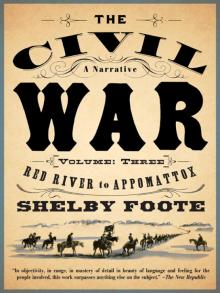 The Civil War: A Narrative: Volume 3: Red River to Appomattox
The Civil War: A Narrative: Volume 3: Red River to Appomattox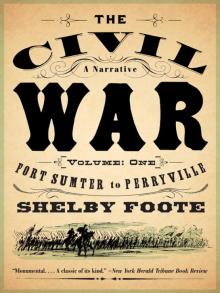 The Civil War: A Narrative: Volume 1: Fort Sumter to Perryville
The Civil War: A Narrative: Volume 1: Fort Sumter to Perryville Jordan County
Jordan County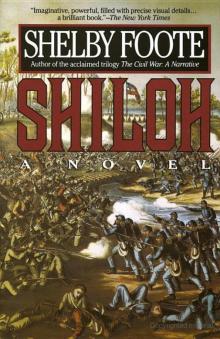 Shiloh
Shiloh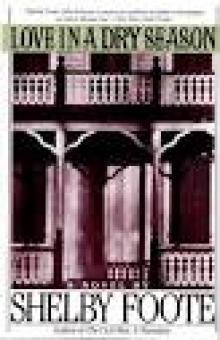 Love in a Dry Season
Love in a Dry Season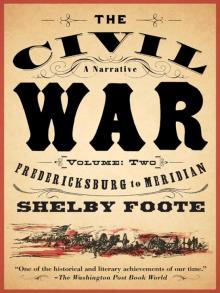 The Civil War: A Narrative: Volume 2: Fredericksburg to Meridian
The Civil War: A Narrative: Volume 2: Fredericksburg to Meridian Chickamauga
Chickamauga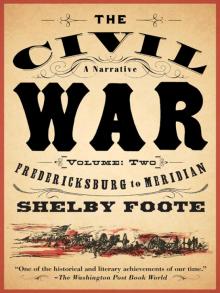 The Civil War: A Narrative: Fredericksburg to Meridian
The Civil War: A Narrative: Fredericksburg to Meridian